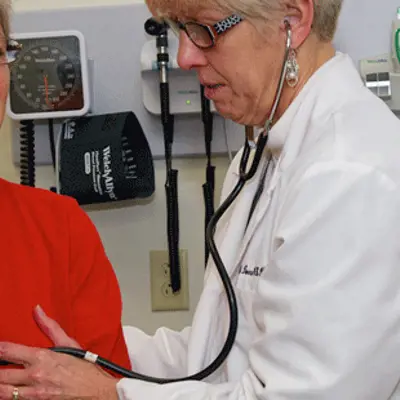
USI grant project works to combat social isolation, strengthen geriatrics workforce
June 1, 2020
In an attempt to limit the spread of coronavirus, many older adults are physically-distanced from their family and friends due to stay-at-home orders and public health recommendations. According to research conducted at Brigham Young University, lack of social connection heightens health risks as much as smoking 15 cigarettes a day. A grant-funded project at the University of Southern Indiana is pivoting during the COVID-19 pandemic to reach out to potentially isolated older adults in order to continue to provide care and to help stay connected throughout the pandemic.
The Geriatrics Workforce Enhancement Program (GWEP), a five-year grant from the U.S. Department of Health and Human Services, Health Resources and Services Administration (HRSA), has focused on bridging the medical and social care provided to older adults through partnerships with Deaconess Clinic and with SWIRCA & More and Generations, two local Area Agencies on Aging (AAA).
As part of the GWEP, Ron Wells, a SWIRCA & More care coordinator, moved to an office at Deaconess Clinic in downtown Evansville in Fall 2019 to offer resources for clinic patients needing assistance in a variety of areas, including medications, food and activities of daily living.
When the pandemic hit and stay-at-home orders were enacted, many non-urgent physician appointments were cancelled. GWEP grant funding allowed Wells to continue to work from home for several weeks where he made daily calls to reach over 500 SWIRCA & More Activity Center members to make sure they had food, cleaning supplies and medication, as well as to provide essential information about the current events occurring in the community.
"Our mission is to provide resources and services that allow individuals who are at risk to remain safely living in their homes," said Jillian Hall, Director of Employee Relations & Special Projects at SWIRCA & More. "To this point, our partnership with USI through the GWEP grant has allowed us to reach a larger population of older adults who may have not been aware of the services SWIRCA & More offers."
Even though the pandemic forced SWIRCA & More to change its outreach tactics, the organization has remained laser-focused on helping the most vulnerable, especially those at risk of moving to a nursing home due to a lack of support in their homes.
"During the time he could not be there in person, Ron was able to provide much needed help for our members," said Hall. "Through the conversations he is having with our members, he has found that some were food insecure and were not sure if they would have enough food to last them through the stay-at-home order. He was able to quickly arrange for SWIRCA to deliver boxes of donated food and household supplies that will last them at least two weeks, if not longer."
Hall added that, while having enough food and medications are of utmost importance during these uncertain times, one of the biggest needs for these at-risk individuals has been met with these daily phone calls from Wells. "He is providing the gift of making these older adults feel connected to our community by knowing that while they may be isolated in their homes, they are never alone," she said.
This model of providing an Area Agency on Aging care coordinator within a primary care clinic will be replicated in year two of the GWEP with a collaboration with Generations, located in Vincennes, and Deaconess Clinic's location in Petersburg, Indiana, according to the grant's primary investigator, Dr. Katie Ehlman, USI Professor of Gerontology and new appointee to the Indiana Commission on Aging.
Ehlman said additional focus areas of the grant have been impacted due to the pandemic and that her team and community partners are collaborating to deliver outcomes in response to the changing environment.
Deaconess Family Medicine Residency Clinic: Dr. Lisa Phifer, Assistant Director of Deaconess Family Medicine Residency, has worked with the GWEP to develop a new rating system for medical residents to prioritize clinic patients at risk for social isolation, food insecurity or unsafe living environments. "Because of the pandemic, many older adults are reluctant to move to short-term or long-term care facilities because of visitor lockdowns and risk of COVID-19 infection," said Phifer. "A lot of people are barely getting by at home, so we developed this tool for making referrals to the GWEP/SWIRCA care coordinator."
According to Phifer, medical residents will interview all patients age 60 and older to determine needs and make referrals to the SWIRCA care coordinator at the Deaconess downtown location. "We anticipate that a subset of referred patients will be connected with SWIRCA & More for ongoing services," said Phifer.
Online Course Modules: Shortly after all University classes were moved to an online setting, the GWEP team developed a six-hour Advance Care Planning (ACP) module and a three-hour module on telehealth for USI courses, internships and clinicals to assist faculty members with relevant healthcare content for their online courses. The ACP module is also available upon request to other GWEPs and university faculty from across the United States.
Virtual Dementia Course: A two-day in-person dementia certification course, scheduled to take place in Evansville in late March with GWEP funding support, was successfully moved to a "live online" format via Zoom. Teepa Snow and her Positive Approach® to Care team led the training for 24 participants. One attendee commented to Snow, "Even though we are all practicing social distancing, your enthusiasm is contagious."
"These are just a few of the areas where we have had to make adjustments," said Ehlman. "Our team continues to assess the environment to identify other grant areas to restructure and pivot. Now more than ever, we need to continue to provide services to older adults and their caregivers in our communities."
Learn more at USI.edu/gwep.